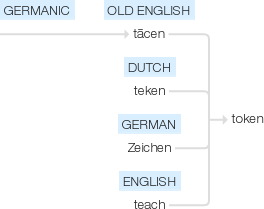Token
Old English tāc(e)n, of Germanic origin; related to Dutch teken and German Zeichen, also to teach.
wiktionary
From Middle English token, taken, from Old English tācn(“sign”), from Proto-West Germanic *taikn, from Proto-Germanic *taikną, from Proto-Indo-European *deyḱ-(“to show, instruct, teach”) with Germanic *k rather than *h by Kluge's law. [1]
The verb is from Middle English toknen, from Old English tācnian. Cognate with German Zeichen.
etymonline
token (n.)
Old English tacen "sign, symbol, evidence" (related to verb tæcan "show, explain, teach"), from Proto-Germanic *taikna- (source also of Old Saxon tekan, Old Norse teikn "zodiac sign, omen, token," Old Frisian tekan, Middle Dutch teken, Dutch teken, Old High German zeihhan, German zeichen, Gothic taikn "sign, token"), from PIE root *deik- "to show," also "pronounce solemnly."
Meaning "coin-like piece of stamped metal" is first recorded 1590s. Older sense of "evidence" is retained in by the same token (mid-15c.), originally "introducing a corroborating circumstance" [OED].
token (adj.)
"nominal," 1915, from token (n.). In integration sense, attested by 1960.
